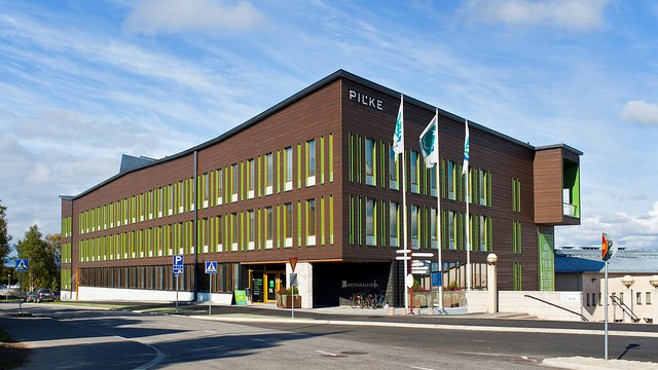Arctic resilience on the agenda in Rovaniemi

The international Arctic Resilience Forum, organised by the Ministry of Agriculture and Forestry of Finland in Rovaniemi on 10–11 September 2018, sought solutions to strengthen climate resilience in the Arctic. About 100 experts on Arctic circumstances from the Nordic countries, United States, Canada and Russia convened in the wood-made building Pilke owned by Metsähallitus.
The forum stressed the importance of cooperation and multidisciplinary research and the role of local communities in promoting climate resilience. The participants agreed that the knowledge of indigenous populations and needs of local residents must be taken into account in all actions to strengthen resilience.
The need for additional resources for adaptation measures was also stressed in the discussions. Potential sources of funding include the Nordic Environment Finance Corporation (NEFCO), EU Horizon 2020 and LIFE instrument, which besides measures to mitigate climate change also offers resources for adaptation.
A lot of work on adaptation is already being done in the Arctic, but in future even closer cooperation and more sharing of good practices will be needed. The forum served this purpose very well, and efforts will be made to further strengthen international cooperation.
Forum enabled the sharing of knowledge and good practices
The practical examples we heard about on the first day concerned the development of custom-made information packages for municipalities in support of climate-related work, use of digital narratives in the work on mental health among indigenous populations, and a mobile application to collect environmental data based on observations of the local residents.
The topics for the second day included the resilience projects of the six Arctic Council Working Groups and education and training events to prepare for weather and climate risks. For example, training in safety issues is needed in Lapland because of the long distances, and the Red Cross is also prepared for the growing risks in the Arctic. Practical measures were also presented, including the restoration of wetlands and adaptation of reindeer herding to climate change.
In a workshop organised for young people local upper secondary students had the chance to play the new Tivoli Utopia discussion game where the focus is on resilience issues. From now on visitors to the Pilke Science Centre can play Tivoli Utopia, which will also be translated into English.
New climate resilient solutions needed fast in the Arctic (press release of the Ministry of Agriculture and Forestry and Ministry for Foreign Affairs, 11.9.2018)
Upper secondary students look into the future at Pilke Science Centre (www.metsa.fi, 12.9.2018, in Finnish)
The potential of the finnish arctic bioeconomy depends on entrepreneurial spirit and cooperation (Policy Brief, Luke, 27.8.2018)
Red Cross Arctic Disaster Management Study (Finnish Red Cross, 3.9.2018)
Preparation for weather and climate risks is possible (SIETO project, www.tietokayttoon.fi, 10.9.2018)
Inquiries at the Ministry of Agriculture and Forestry:
Saara Lilja-Rothsten, Ministerial Adviser, tel. +358 29 516 2060, firstname.lastname@mmm.fi
Heidi Alatalo, Planning Officer, tel. +358 29 516 2046, firstname.lastname@mmm.fi
|
|
|
| Pipaluk Lykke told about the Arctic Nomad project which aims to strengthen the traditional dog sledding culture of the Greenland’s Inuit. The project aims to find ways for the Inuit to earn a living and improve their physical and mental health. Dog sledding culture is also strong in Alaska and Canada. Picture: Otto Ponto |



